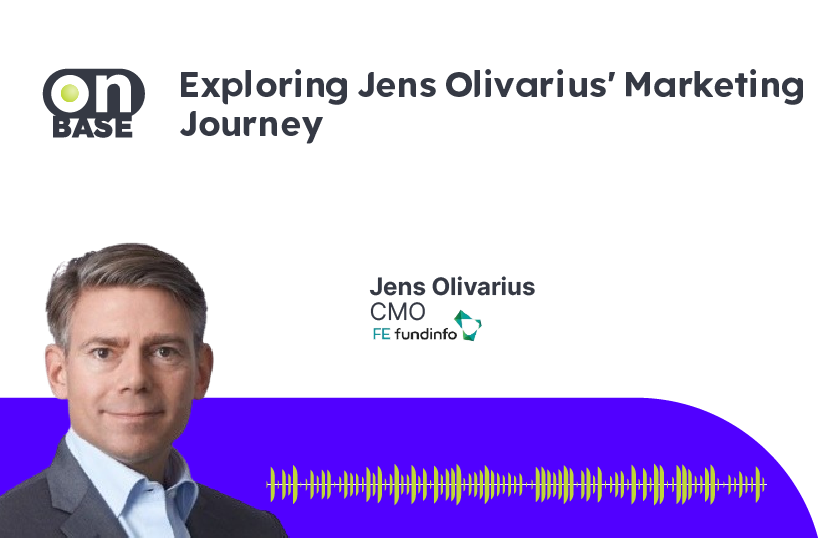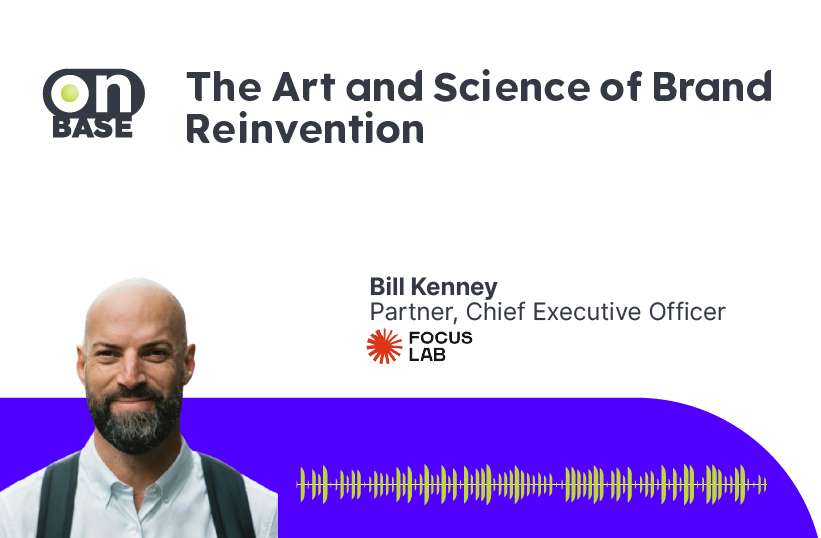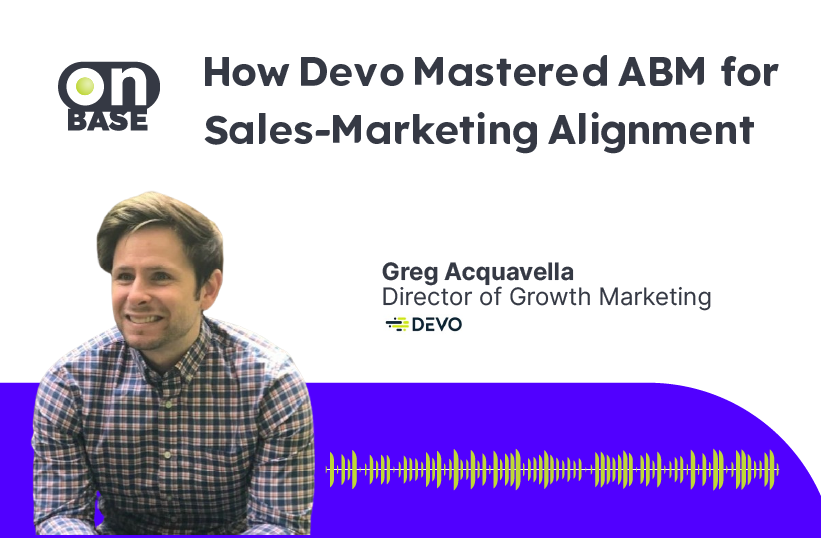Shownotes
This episode discusses the evolving role of marketing and how it is adapting to changes in buyer behavior and new technologies like AI. Jens Olivarius shares insights from his extensive career in marketing leadership roles. Key topics include the importance of understanding buyer intent, being relevant and creative in communications and aligning sales and marketing efforts through shared goals and processes. There is discussion about how AI can enhance jobs by automating repetitive tasks and improving products. The importance of focusing marketing efforts on the right target accounts and cutting wasteful spending rather than resources is also covered.
Best Moments
-
Jens shares his experience establishing a marketing operations function early in his career at SAS Institute
-
How Jens sees AI as an opportunity rather than a threat, and its potential to improve products/services.
-
The importance of understanding buyer intent and how it helped uncover additional opportunities at SimCorp.
-
The importance of aligning sales and marketing through shared goals and processes.
-
A success story of how understanding intent through Demandbase helped uncover and win a much larger deal.
About the guest
Jens Olivariusis the CMO at FE fundinfo, previously being part of the Executive team at MDM Solutions company Stibo, and CMO at SimCorp, a global investment management IT solutions company, following an 18-year career with SaaS Institute where he undertook a variety of sales and marketing roles both in the US and Denmark. He presently resides in the beautiful city of Copenhagen.
Key takeaways
- Marketing is evolving due to shifts in buyer control and the need for more relevant, creative communications
- Tactics like email are still relevant when used strategically, targeting the right audience at the right time
- AI can enhance jobs by automating repetitive tasks, freeing up time for creativity and strategic work
- Aligning sales and marketing is crucial through shared goals, processes, and a focus on customer experience
- Understanding buyer groups within organizations leads to more effective engagement
- Cutting wasteful spending, not resources, is important when budgets are tight
Quotes
“AI took my job to new levels. And I think that’s really what it’s about, to a large extent. It’s about a new technology, a new set of tools out there that can help you increase productivity.”
-Jens Olivarius
Highlights from this episode
What particularly excites you about where marketing is today and where it’s going in the future?
One of the things that particularly excites Jens about where marketing is going is the shift in control of the narrative from marketing to the buyer. He notes that buyers today, especially in B2B, are in control of a lot and marketers need to be highly relevant to what buyers are looking for.
He’s also excited by the opportunity for marketers to get more creative in how they communicate and connect with buyers. With more channels and touchpoints, marketers need to find innovative ways to engage buyers in a way that caters to their needs and busy schedules.
Jens sees big potential for AI to not just improve productivity but to enhance products/services. He believes AI will allow marketers to better understand data and customer requirements to improve decision-making and serve buyers in a more personalized way.
In what areas do you see AI making a real difference and your thoughts on perceived job threats?
In terms of areas where Jens sees AI making a real difference, he highlighted two main ones:
- Productivity – AI can automate repetitive tasks, allowing marketers to focus on more strategic, creative work rather than mundane activities. This could increase individual and team productivity.
- Product/service quality – By automating things like data quality checks and helping uncover new connections and insights, AI can help improve the core offering. For a data company like SimCorp, AI could enhance investment decisions by improving data accuracy and analysis.
In terms of perceived job threats, Jens doesn’t see AI as a threat but rather an opportunity. He believes AI will take over less exciting tasks, not entire jobs. This will free up time for marketers to focus on more enjoyable, important responsibilities. Overall he’s optimistic that AI will enhance rather than replace marketing roles by augmenting human capabilities.
Why is aligning sales and marketing so important, especially in B2B?
Aligning sales and marketing is crucial for B2B organizations according to Jens Olivarius. This is because the nature of B2B buying and selling processes necessitates a holistic approach across both functions.
B2B sales cycles tend to be much longer than B2C, involving numerous touchpoints with various stakeholders over time. Coordinating marketing and sales efforts is important to navigate these complex pathways to purchase. Seeing the customer journey as a continuum, rather than separate silos, opens more opportunities to gain additional sales through upselling and cross-selling.
Longer sales cycles also mean marketing requires a longer-term focus on building brand preference and demand. Close alignment helps marketing support this strategic goal while sales concentrates on closing deals. Setting shared targets across both teams, from revenue to customer satisfaction, fosters the right collaborative mindset.
With buying committees the norm, a unified message is key to swaying group decisions. Clear role definitions and processes outlining touchpoint responsibilities ensure marketing and sales sing from the same song sheet. This ultimately improves the customer experience – the true priority over individual function metrics like attribution.
How do you feel is the best way for businesses to overcome a lack of trust between sales and marketing leaders?
Jens believes the best way for businesses to overcome a lack of trust between sales and marketing leaders is through open communication and process definition. Specifically, he recommends:
- Reviewing and redefining the underlying processes for how leads flow from initial contact through the customer lifecycle. This provides clarity on each team’s roles and responsibilities.
- Having constructive discussions to agree on how marketing and sales should work best together given the business’ constraints and operating models.
- Establishing shared targets that both functions are measured by, beyond just lead generation metrics. Look at overall goals like revenue, new customers, and customer satisfaction.
- Demonstrating the success of the aligned approach in real-life work by coordinating activities and seeing the results.
The key is taking time to gain a shared understanding of each other’s perspectives and goals. With the right processes and metrics in place, sales and marketing can build the necessary trust to collaborate effectively.
What experience have you had with ABM/intent data and do you think intent is a key part of any B2B play?
Jens shared a very positive experience with ABM and intent data from his time at SimCorp. He described how monitoring intent signals through Demandbase uncovered additional opportunities within an existing customer.
Marketing was able to provide sales insights about the prospect’s interest in new product areas beyond just what the initial sales discussion covered. This allowed sales to expand the deal scope, resulting in a much larger contract than anticipated.
Jens believes this outcome would not have been possible without understanding the customer’s true intent signals. He sees intent data as incredibly valuable for informing sales engagements and uncovering additional cross-sell/upsell opportunities.
Based on this success story and other examples, Jens is a strong proponent of intent as a core part of any effective B2B strategy. He views it as key for staying relevant to buyers and maximizing revenue potential within accounts.
We hear about companies cutting marketing budgets under pressure – what are your thoughts on this approach?
Jens is skeptical of the approach of cutting marketing budgets under financial pressure as a short-term fix. While he understands the desire from a financial perspective, he believes it ultimately undermines long-term growth.
His view is that you cannot save yourself from growth – marketing plays an important role in supporting future revenue. When cuts are necessary, he advocates for a balanced approach that considers both resources and people.
Rather than only removing discretionary spending, it’s important to ensure the marketing function retains enough budget to operate effectively. Cutting headcount alone risks hampering execution.
Jens also notes the importance of first eliminating truly wasteful spending, like irrelevant advertising, before reducing other areas. This could free up funds while improving pipeline quality.
Overall, he agrees budget cuts are an unfortunate reality sometimes. However taking a strategic, balanced view that protects marketing’s ability to perform its long-term role is most likely to set a business up for continued success.

OnBase
Bridging the Divide, Between Sales and Marketing




